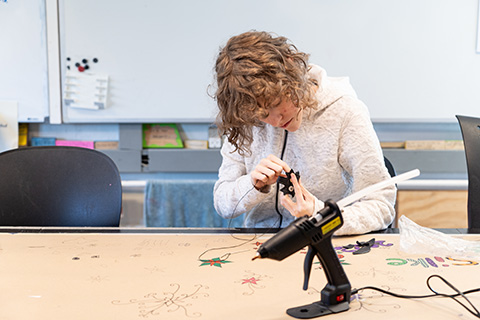
Registration Opens for SAF 2025: International STEAM Azerbaijan Festival Welcomes Global Youth
The International STEAM Azerbaijan Festival (SAF) has officially opened registration for its 2025 edition!

From the 2025/2026 school year, students in 8th and 9th grade in Denmark will have the option to participate in the Junior Master Apprenticeship program, a new initiative designed to combine school-based learning with practical work experience. The scheme allows students to spend 1–2 days per week at a company, vocational training program, FGU (Preparatory Basic Education and Training) institution, or municipal youth school, while continuing their academic education on the remaining days, focusing at a minimum on Danish and mathematics.
Each municipality is responsible for creating a locally adapted model for the program, and schools can use a template for internship agreements to outline responsibilities for students, parents, and internship sites. The school principal must approve the agreement, ensuring the internship meets the program’s educational standards and expectations. Municipalities and schools are encouraged to coordinate with students, parents, and companies to align expectations, plan activities, and define supervision and support needs.
Students in the program will follow a teaching distribution of up to four-fifths of the total 1,400 hours on Danish and mathematics, and up to two-fifths in internships or practical courses, ensuring they receive a comparable amount of instruction to students not in the program.
Upon completion, students will take the primary school leaving exam with a Junior Master Apprenticeship certificate. To pass, students must achieve a minimum grade of 2 in Danish and mathematics and participate in a final evaluation interview regarding their apprenticeship experience. This certificate provides access to vocational education pathways, though it does not grant access to EUX programs that combine vocational and upper secondary education.
The main aim of the initiative is to create more flexible and diverse educational pathways in Denmark, offering a hands-on alternative to the traditional academic track and supporting those who are more practically inclined.
Share

Registration Opens for SAF 2025: International STEAM Azerbaijan Festival Welcomes Global Youth
The International STEAM Azerbaijan Festival (SAF) has officially opened registration for its 2025 edition!

Join the Edu-live Internship Program!
Are you passionate about journalism, education, science, as well as global study and development opportunities? Do you want to be part of a dynamic media platform that brings educational and scientific news and stories to life from around the world?

Young Leaders Union Conference 2025 in Paris (Fully Funded)
Join Global Changemakers in Paris! Fully Funded International Conference for Students, Professionals, and Social Leaders from All Nationalities and Fields

An mRNA cancer vaccine may offer long-term protection
A small clinical trial suggests the treatment could help keep pancreatic cancer from returning

Yer yürəsinin daxili nüvəsində struktur dəyişiklikləri aşkar edilib
bu nəzəriyyənin doğru olmadığı məlum olub. Seismik dalğalar vasitəsilə aparılan tədqiqatda daxili nüvənin səthindəki dəyişikliklərə dair qeyri-adi məlumatlar əldə edilib.

Lester B Pearson Scholarship 2026 in Canada (Fully Funded)
Applications are now open for the Lester B Pearson Scholarship 2026 at the University of Toronto!